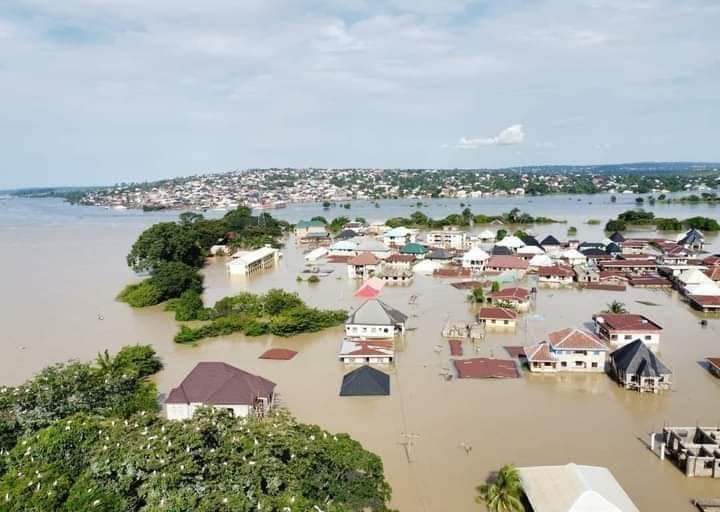As the rains intensify with the attendant flooding, Nigeria is facing a most serious humanitarian crisis that has affected the economy as exemplified by the challenges of road transportation and fuel scarcity in major cities.
The floods have affected 31 out of the 36 states in the country claiming, in their tide, houses and farmlands. States mostly affected in this devastating scenario that has also claimed lives include Lagos, Yobe, Borno, Taraba and Adamawa. Others are, Edo, Delta, Kogi, Niger, Plateau, Benue, Ebonyi, Anambra, Bauchi, Gombe, Kano and Jigawa. Zamfara, Kebbi, Sokoto, Imo, Abia and the Federal Capital Territory are, so far, not spared in this mayhem that is becoming perennial.
It is instructive to note that the minister for Humanitarian Affairs, Disaster Management, and Social Development, Sadiya Umar Farouq, has disclosed that 603 people were confirmed dead while 2,407 persons have been injured, a total of 2.5 million people have been affected and 82,053 houses have been completely damaged.
Anambra State Governor, Chukwuma Soludo said one-third of the state has been submerged by flood, turning the already “bad situation” of the state as the “erosion capital of Nigeria” to “worse”.Also, residents of Aeroplane Road in Yenagoa, Bayelsa State, and Bomadi local government Area of Delta State had raised the alarm over floating corpses from submerged cemeteries in their areas.
According to reports, the floods were caused by the release of excess water from Cameroon’s Lagdo dam. This has been denied by relevant authorities in Nigeria. Actually, Minister of Water Resources, Suleiman Adamu, had said that 80 percent of the floods in Nigeria are caused by rainfall and not Cameroon’s Lagdo dam as widely believed. Regardless, experts are of the opinion that climate change is responsible for the excessive rain this year that is generating the flood.
The question is why have successive governments paid lip service to the completion of the Dasin Hausa Dam in Adamawa State which is said to be three times the size of the Lagdo Dam in Cameroon. That uncompleted dam is expected to be a collector of the excess water from Lagdo dam.
As if the situation was not bad enough, meteorological agencies are still warning that states like Anambra, Delta, Cross River, Rivers, and Bayelsa are still at risk of experiencing floods up till the end of November. Presently, some states are experiencing excruciating fuel scarcity because of flooding.
This newspaper is not impressed with the efforts of the federal and state government in the management of the humanitarian crisis. We recall that the meteorological agencies had warned at the beginning of the year that there will be excessive rainfall this year, yet most states were caught napping with no arrangement to manage the resultant crisis. In what is becoming a recurring decimal in the country, the government is always reacting instead of taking proactive measures to alleviate the anticipated hardships.
The ongoing blame game between the federal and state governments over the flood, in our view, is unhelpful. What is on ground is a national emergency and there is no time for finger-pointing. This is the time for both the federal and state government to show leadership and lead from the front.
In our opinion, the federal government should declare a national emergency on flooding and all hands ought to be on deck to minimize the humanitarian crisis.
Already, the World Food Programme and the UN’s Food and Agriculture Organisation said in September that Nigeria was among six countries facing a high risk of catastrophic levels of hunger. So far, 332,327 hectares of farmlands have been destroyed by the flooding. Regrettably, the insecurity in the rural areas combined with the recent flooding will trigger a mass shortage of food.
It is from this perspective that we aver that politicking should take a back seat for now. The country already has enough internally displaced persons due to the insecurity in the country. With the displaced persons due to flooding, it is going to be a huge financial drain on the states.
We also appeal to private individuals and corporate bodies to come to the aid of states to lessen their financial burden. Consequently, there is a need to revive the River Basin Authorities. States should stick to the master plan of development and houses on drainage channels should be demolished. Building and planning agencies should be alive to their responsibilities.
Similarly, River Niger and Benue need to be dredged continuously while state governments should build more drainages to channel water in the event of excessive rainfall. We need to break the cycle of flooding every year. The time for action is now.





